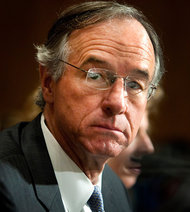The reporting period included Thanksgiving and Black Friday, the official kickoff of the critical holiday shopping season. Early reports regarding those days had been mixed, and the individual retailers’ dim results suggest a big challenge in the coming weeks for retailers.
Craig Johnson, a retail consultant and president of Customer Growth Partners, said that early November was weak across the board and not just in the Northeast, which was hit by Hurricane Sandy in late October.
“The traditional post-Black Friday lull, normally starting the following week, started on … Black Friday,” Mr. Johnson wrote in an e-mail. Activity in shopping malls slowed down starting about noon that Friday, he said, “right about the time the early bird specials expired, and long after the Thanksgiving evening doorbuster items were all sold out — leaving financially stressed consumers with little reason to shop” so many weeks away from Christmas.
Over all, the 16 retailers tracked by Thomson Reuters that reported results Thursday recorded a 1.6 percent increase in sales at stores that were open at least a year. Analysts had expected a 3.3 percent jump.
It was the major chains’ results that were most troubling. Target, Kohl’s and Macy’s typically promote holiday shopping heavily, while Nordstrom sales tend to give an indication of how higher-income consumers are feeling.
Kohl’s sales at stores open at least a year dropped 5.6 percent, recording negative sales in all regions. Analysts expected a 1.9 percent gain. The company seemed to be the victim of its own “showrooming,” when consumers visit stores to see the merchandise but end up buying online. The company noted “a significant shift in Black Friday-related sales into our e-commerce channel.”
Target’s sales at stores open at least a year fell 1 percent, and its overall sales for the month decreased 0.1 percent from last November. Analysts had been looking for a 2.1 percent increase. Gregg Steinhafel, chief executive, said in a statement that profitability “remained on plan.”
Nordstrom, where same-store sales fell 1.1 percent, said the problem was a weaker-than-expected clearance sale. “Customers continue to demonstrate a strong preference for fashion and newness, which has made clearance events less compelling,” the company said. Hurricane Sandy also hurt sales in the first part of the month, it said. Analysts had projected a 4.3 percent increase.
Macy’s same-store sales fell 0.7 percent, missing analyst expectations of a 1.5 percent increase. The company said it had the largest-volume Thanksgiving weekend in its history — meaning the highest number of transactions, though not necessarily sales — but blamed Hurricane Sandy for the month’s decline.
Many of the nation’s big retailers no longer report same-store sales, including Walmart, the largest, J. C. Penney and Saks. Early on Black Friday morning, Walmart sent out a statement reporting larger crowds than last year at its stores.
Specialty and warehouse stores fared better than the large chains. Costco posted a 6 percent rise in same-store sales, half a percentage point above analysts’ expectations. Limited, the parent company of Victoria’s Secret, said same-store sales rose 5 percent. Gap missed its 3.9 percent estimated increase, but still posted a 3 percent rise. Same-store sales rose 13. 2 percent at Stage Stores and 7.1 percent at Stein Mart, two small chains.
Some shoppers said the deals this year were not good enough to get them to buy. “We looked through the ads and didn’t see anything we really wanted,” said Lisa Apple, 46, who was shopping in Columbus, Ohio, on Black Friday. “The good deals were on TVs, but how many TVs do you need?”
Another shopper, Laura Schimpf, 32, who lives in Delaware, Ohio, and works for the state’s government, agreed. “The deals don’t seem too good. We really had to hunt for good ones. I’ve been looking online for three weeks,” she said.
Christopher Maag contributed reporting from Columbus, Ohio.
Article source: http://www.nytimes.com/2012/11/30/business/sales-at-nations-retailers-fall-short.html?partner=rss&emc=rss
